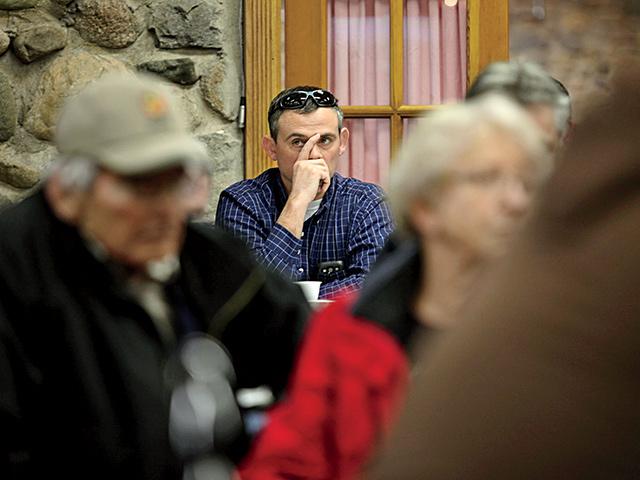Stamps May Be Headed to Federal Trial
Michigan Judge Approves DOJ's Request to Withdraw Melissa Stamp Agreement
OMAHA (DTN) -- Decatur, Michigan, farmers Michael and Melissa Stamp are heading to trial after their plea agreements were withdrawn by a federal court.
Despite reaching deals on felony charges in April 2019 connected to a Chapter 11 bankruptcy, the Stamps now face a June 8, 2020, court hearing on the way to trial.
At the end of March, U.S. District Judge Paul L. Maloney in the U.S. District of Western Michigan granted a U.S. Department of Justice request to withdraw Melissa Stamp's agreement, as well, because it was contingent on Michael Stamp's guilty plea.
Michael Stamp has now withdrawn that plea after the court previously rejected it for not meeting sentencing guidelines.
The Stamps' legal cases have been tied up in court since they filed bankruptcy on their farm operation in late 2012. At one time, the couple's farming operation encompassed a reported 27,000 acres, though they were accused of claiming even larger acreage to secure operating loans.
Michael Stamp originally pled guilty to conspiracy to commit bank fraud and providing false statements.
Melissa Stamp pled guilty in federal court in June 2015 to misprision of felony -- failure to report a crime to authorities and potentially helping conceal it. She was sentenced to 20 months in jail, 20 months of supervised release and was required to pay restitution for her role in alleged bankruptcy fraud.
On Dec. 13, 2017, a federal grand jury handed down an indictment of Michael Stamp and two other men in connection with the Stamp Farms Chapter 11 bankruptcy filed in November 2012. The bank found Stamp Farms in noncompliance on loan agreements, including working capital and other ratios. Michael Stamp is the former owner of the farm.
P[L1] D[0x0] M[300x250] OOP[F] ADUNIT[] T[]
On Jan. 23, 2020, however, the court rejected Michael Stamp's plea agreement to accept up to five years in prison because of a disparity with sentencing guidelines.
According to the judge's notice of possible rejection announced in January, sentencing guidelines set the range at between 12.6 years to 15.7 years.
In addition, James Leonard Becraft Jr. pleaded guilty to conspiracy to make false statements on crop insurance forms in the Stamp Farms case. On Feb. 12, 2019, he was sentenced to a year in prison, a two-year supervised release and ordered to pay $648,188 in restitution to the Risk Management Agency in Kansas City, Missouri.
Becraft has since asked the federal court to reduce the restitution amount, claiming his legal counsel was ineffective.
In a motion filed in the Michigan court on April 13, 2020, the U.S. Department of Justice said Becraft's counsel already fought for and received a reduction in restitution.
"Here, Becraft's counsel not only objected to the loss amount, he succeeded in reducing it from $2,723,430 to $648,188," the motion said.
DTN reached out to the Stamps' attorneys for comment but did not receive an immediate response.
The Stamp Farms bankruptcy case left southwestern Michigan landowners and creditors jolted by what legal experts believe was, at the time, the largest grain farm bankruptcy in U.S. history.
According to the December 2017 indictment, the losses alleged in the fraud total about $60.5 million.
According to court documents in Stamp's individual bankruptcy case, Wells Fargo claimed it had made a $68 million loan in December 2011 based on representations that Stamp Farms and its affiliates farmed 46,000 acres. Audits later could uncover only about 27,000 acres, the bank claimed.
The indictment said Stamp rapidly increased the number of acres the company farmed by acquiring agricultural land leases from landowners in southwest Michigan, "often by paying above-market rates."
Over the years, Stamp relied on "large" operating loans and credit agreements. In addition, the indictment said, Stamp used crop insurance payments to pay for some of his operation, including covering lease payments.
Starting in 2011, Stamp needed money to keep his farm going and to pay off an outstanding loan. Between March and December of that year, Stamp allegedly provided false information to obtain about $68 million in credit from Wells Fargo by misrepresenting the amount of land he farmed and the value of his farming assets, the grand jury said.
According to the indictment, when the bank extended his credit, Stamp allegedly continued to provide false information about his operation. In addition, Stamp allegedly submitted false claims to the Federal Crop Insurance Corporation in order to get crop insurance payments.
According to a news release from the U.S. Department of Justice, at the time of her guilty plea, Melissa Stamp admitted to giving $75,000 to her brother and about $90,000 to her father to conceal the money from a bankruptcy case that was filed in November 2012 by her husband. She also admitted to concealing $40,000 in a safe in her home, according to DOJ, but none of the money was disclosed to the bankruptcy court.
Todd Neeley can be reached at todd.neeley@dtn.com
Follow him on Twitter @toddneeleyDTN
(c) Copyright 2020 DTN, LLC. All rights reserved.




